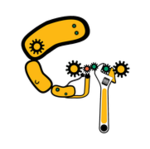About This Project
Animal cells have a structure on their cell surface called integrins, which sense the environment around them and can manipulate it. We are attempting to express these integrins for the first time on bacteria cells (specifically E.Coli) to create a "BioBot", essentially a bacterial robot than can be manipulated to perform specific tasks. These BioBots will be able to do all kinds of things in the human body, like clotting surface wounds and detecting cancer cells.Ask the Scientists
Join The DiscussionWhat is the context of this research?
All cells have some ability to sense their environment, but mammalian cells have evolved much more sophisticated and developed sensors that allow cells to communicate with their environment and react to it in certain ways. Our team decided to ask if it is possible for prokaryotic cells (like E.Coli) to express these sensors and communicate with their environment in the same way eukaryotic cells do. To answer this question, our research team is attempting to express human integrins (heterodimeric sensors on the surface of cells responsible for signaling and communication) on Escherichia coli cells. We believe this is possible through the use of autodisplay technology, a technique that allows the transport of proteins through the periplasmic space in an E. coli cell.
What is the significance of this project?
This research is being conducted by the Georgia Tech iGEM Team as part of an international synthetic biology competition. We believe this research is special, intriguing, and important enough to warrant its thorough study and research. The long-term potential applications of this project is in the creation of "BioBots": biologically-based robots expressing integrins that have specific functions and can be used in the medical field. The integrins we are studying aid in the binding of platelets with fibrinogen to clot wounds; this idea could eventually become a medical treatment for the treatment of severe surface wounds. Additionally, since integrins respond to very specific and unique signals on the surface of the extracellular matrix, it has the potential to be used within the body for advancements such as localized drug delivery or even the detection and treatment of cancerous cells. While our research is mainly proof of principle, the implications of a successful project are immense.
What are the goals of the project?
In order to carry out this project, we will need not only the necessary equipment required (Plasmid Purification Miniprep kits, agar plates, cell cultures, restriction enzymes, etc.) but also money to help cover our competition fees. This ~$4000 will allow us to purchase these necessary supplies as well as cover the cost of synthesis of DNA and primers. Any amount of money is appreciated.
Budget
Our budget will be used to cover a large portion of our supplies and servicing, as well as help cover the attendance fees for the iGEM Regional Jamboree competition in October and the World Championship iGEM Jamboree in November.
Meet the Team
Affiliates
Team Bio
The Georgia Tech iGEM team consists of 7 undergraduate students dedicated to research and innovation. The research is being conducted entirely by the students, with advising from graduate students and post-docs. While most of the team is very young, we are ambitious and excited to pursue this research. We will be traveling to the University of Toronto in October to showcase our research at the iGEM regional competition. Through our research, we hope to not only gain invaluable knowledge for our studies but also foster a more permanent place for iGEM teams at Georgia Tech in the future.Georgia Tech iGEM
The Georgia Tech iGEM team consists of 7 undergraduate students dedicated to research and innovation. The research is being conducted entirely by the students, with advising from graduate students and post-docs. While most of the team is very young, we are ambitious and excited to pursue this research. We will be traveling to the University of Toronto in October to showcase our research at the iGEM regional competition. Through our research, we hope to not only gain invaluable knowledge for our studies but also foster a more permanent place for iGEM teams at Georgia Tech in the future.
Lab Notes
Nothing posted yet.
Additional Information

Project Backers
- 9Backers
- 17%Funded
- $665Total Donations
- $73.89Average Donation
